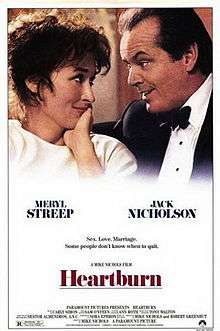Heartburn (film)
| Heartburn | |
|---|---|
 Original theatrical release poster | |
| Directed by | Mike Nichols |
| Produced by |
|
| Screenplay by | Nora Ephron |
| Based on |
Heartburn by Nora Ephron |
| Starring | |
| Music by | Carly Simon |
| Cinematography | Néstor Almendros |
| Edited by | Sam O'Steen |
| Distributed by | Paramount Pictures |
Release dates |
|
Running time | 109 minutes[1] |
| Country | United States |
| Language | English |
| Budget | $15 million[2] |
| Box office | $25.3 million[3] |
Heartburn is a 1986 American comedy-drama film directed and produced by Mike Nichols, and stars Meryl Streep and Jack Nicholson. The screenplay by Nora Ephron is based on her semi-autobiographical novel of the same name, which was inspired by her tempestuous second marriage, to Carl Bernstein and his affair with Margaret Jay, the daughter of former British Prime Minister James Callaghan.
The film's theme song, "Coming Around Again", written and performed by Carly Simon, became one of 1986's Billboard hits, reaching #18 on the Hot 100 and #5 on the Adult Contemporary chart.
Plot
New York City food writer Rachel Samstat (Streep) and Washington, D.C. political columnist Mark Forman (Nicholson) meet at a mutual friend's wedding, and they marry, after a whirlwind courtship, despite Rachel's reservations. They purchase a dilapidated Georgetown townhouse in Washington D.C. and the ongoing and seemingly never-ending renovations create some stress in their relationship. Rachel, overjoyed to discover she is pregnant, is determined to make her marriage work and becomes a stay-at-home mom. When she discovers evidence of Mark's extramarital affair with socialite Thelma Rice during her pregnancy with her second child, she leaves him and takes their daughter Annie to New York, where she moves in with her father and tries to jump start her career. Mark eventually convinces her to return home, but Rachel obviously leaves him, after his philandering continues.
Cast
- Meryl Streep as Rachel Samstat
- Jack Nicholson as Mark Forman
- Stockard Channing as Julie Siegel
- Jeff Daniels as Richard
- Miloš Forman as Dmitri
- Steven Hill as Harry Samstat
- Catherine O'Hara as Betty
- Mamie Gummer as Annie Forman
- Joanna Gleason as Diana
- Anna Maria Horsford as Della
- Richard Masur as Arthur Siegel
- Maureen Stapleton as Vera
- Mercedes Ruehl as Eve
- Kevin Spacey as Subway Thief
- Karen Akers as Thelma Rice
Production and notes
The film was shot on location in Manhattan, Washington, D.C. and Alexandria, Virginia. Jack Nicholson replaced Mandy Patinkin after one day of shooting.[4] It marked Kevin Spacey's film debut.
The film's music was composed by Carly Simon, whose songs "Coming Around Again" and "Itsy Bitsy Spider" in the end credits, are included on her Grammy nominated 1987 album Coming Around Again.
Release
Critical reception
The film received mixed reviews from critics and currently holds a 47% rating at Rotten Tomatoes, based on 15 reviews.[5]
Roger Ebert of the Chicago Sun-Times called it "a bitter, sour movie about two people who are only marginally interesting" and placed much of the blame on screenwriter Nora Ephron, who "should have based her story on somebody else's marriage. That way, she could have provided the distance and perspective that good comedy needs." He felt "she apparently had too much anger to transform the facts into entertaining fiction."[6]
Variety thought it was "a beautifully crafted film with flawless performances and many splendid moments, yet the overall effect is a bit disappointing" and added, "While the day-to-day details are drawn with a striking clarity, Ephron's script never goes much beyond the mannerisms of middle-class life. Even with the sketchy background information, it's hard to tell what these people are feeling or what they want."[7]
Pauline Kael of The New Yorker wrote: "The movie is full of talented people, who [...] are fun to watch, but after a while the scenes that don't point anywhere begin to add up, and you start asking yourself: 'What is this movie about?' You are still asking when it's over, and by then a flatness, a disappointment, is likely to have settled over the fillips you'd enjoyed," noting that "[t]hough Ephron is a gifted and a witty light essayist, her novel is no more than a variant of a princess fantasy: Rachel, the wife, is blameless; Mark, the husband, is simply a bad egg—an adulterer. And, reading the book, you don't have to take Rachel the bratty narrator very seriously; her self-pity is so thinly masked by humor and unabashed mean-spiritedness that you feel that the author is exploiting her life—trashing it by presenting it as a juicy, fast-action comic strip about a marriage of celebrities."[8]
In his film guide, Leonard Maltin gave the film 3 stars, out of a possible 4, and wrote "Lightweight, superficial story is supercharged by two charismatic stars, who make it a must see."[9]
Box office
The film opened in 843 theaters in the United States on July 25, 1986, and earned $5,783,079 during its opening weekend, ranking #2 at the box office behind Aliens. It eventually grossed a total of $25,314,189 in the US.[3]
Accolades
Streep was named Best Actress at the Valladolid International Film Festival for her performance.
References
- ↑ "HEARTBURN (15)". British Board of Film Classification. July 1, 1986. Retrieved August 4, 2015.
- ↑ http://powergrid.thewrap.com/project/heartburn
- 1 2 BoxOffice Mojo.com
- ↑ Eila Mell (6 January 2005). Casting Might-Have-Beens: A Film by Film Directory of Actors Considered for Roles Given to Others. McFarland. pp. 118–. ISBN 978-0-7864-2017-9.
- ↑ Heartburn at Rotten Tomatoes
- ↑ Chicago Sun-Times review
- ↑ Variety review
- ↑ Pauline Kael, "Pairs", The Current Cinema, The New Yorker, August 11, 1986, page 77
- ↑ Maltin, Leonard. 2013 Movie Guide. Penguin Books. p. 598. ISBN 978-0-451-23774-3.